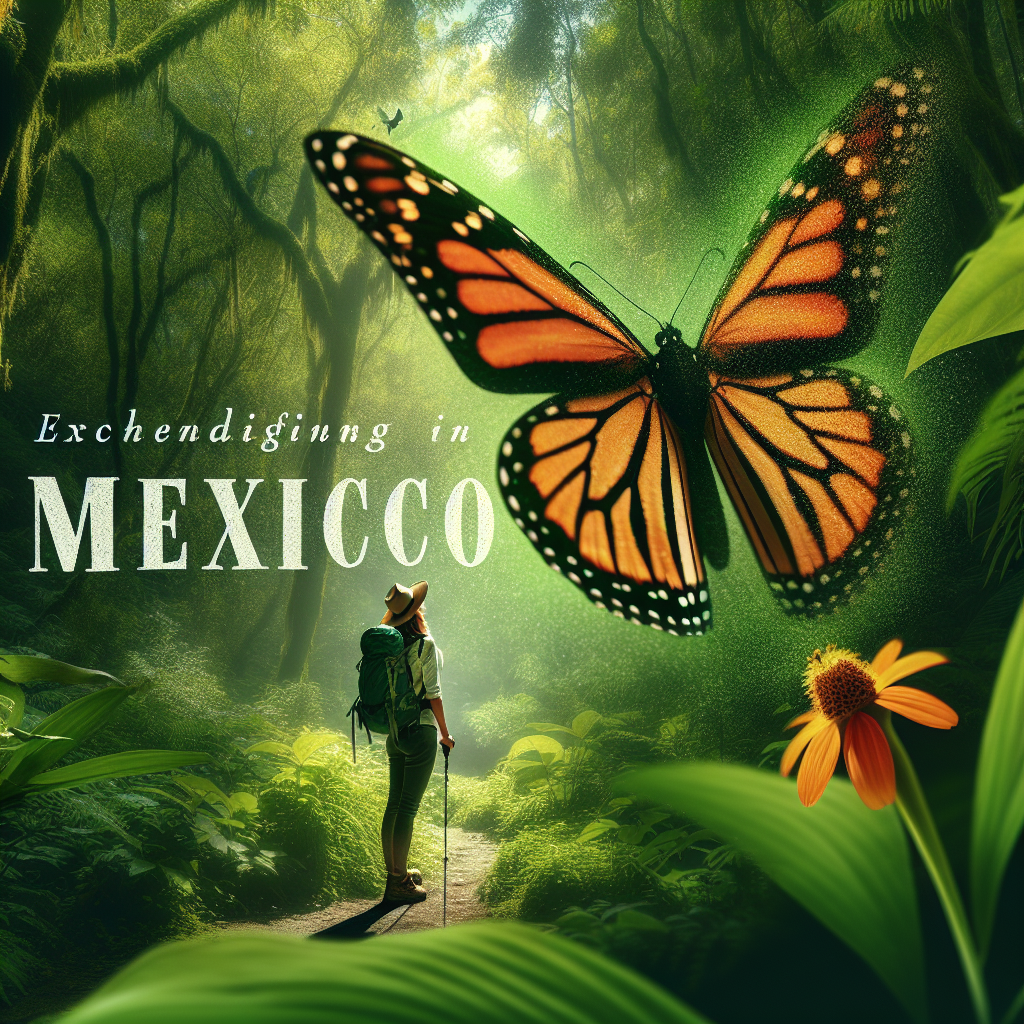Imagine yourself surrounded by breathtaking natural landscapes, vibrant wildlife, and an unparalleled sense of tranquility. Mexico’s ecotourism offers a unique opportunity to connect with nature like never before. From exploring ancient ruins nestled in lush jungles to diving into crystal-clear cenotes, this article will take you on a journey through Mexico’s sustainable adventures in nature. Get ready to embark on a transformative experience that will not only awaken your senses but also leave a positive impact on the environment.

Exploring Mexico’s Ecotourism Industry
Understanding the concept of ecotourism
Ecotourism is a form of tourism that focuses on responsible travel to natural areas while promoting conservation and sustainability. It emphasizes the connection between travelers and nature, encouraging them to appreciate and protect the environment they visit. The concept of ecotourism aims to educate and raise awareness about the importance of preserving natural resources and supporting local communities.
The growth and popularity of ecotourism in Mexico
Mexico has witnessed a significant growth in its ecotourism industry in recent years. This surge in popularity can be attributed to the country’s diverse ecosystems, rich biodiversity, and breathtaking natural landscapes. Travelers from around the world are increasingly drawn to Mexico’s ecotourism offerings, seeking authentic experiences in stunning natural settings.
Economic and environmental benefits of ecotourism
Ecotourism not only benefits the environment but also serves as a catalyst for economic growth in Mexico. By attracting tourists to natural areas, ecotourism generates revenue that can be reinvested in local communities and conservation efforts. Furthermore, it provides employment opportunities for residents in rural areas and supports small-scale businesses, contributing to sustainable development.
Government initiatives and policies supporting ecotourism
Recognizing the potential of ecotourism, the Mexican government has implemented various initiatives and policies to support and promote this industry. The National Tourism Development Plan includes strategies to enhance sustainable tourism practices, protect natural resources, and ensure the well-being of local communities. These efforts aim to create a balance between tourism growth and environmental conservation.
Ecotourism Destinations in Mexico
The diverse ecosystems of Mexico
Mexico is blessed with a wide range of ecosystems, making it a paradise for ecotourists. From lush rainforests to pristine beaches, sprawling deserts to towering mountains, Mexico offers an incredible variety of natural landscapes to explore. Each ecosystem boasts unique flora and fauna, providing endless opportunities for nature enthusiasts to immerse themselves in the country’s biodiversity.
Popular ecotourism destinations in Mexico
Among the top ecotourism destinations in Mexico is the Riviera Maya, home to the iconic Mayan ruins, stunning cenotes, and the world’s second-largest barrier reef. The Baja California Peninsula entices visitors with its marine life, desert landscapes, and vibrant cultural heritage. Other notable ecotourism hotspots include Chiapas, Oaxaca, and the Yucatan Peninsula, each offering its own distinct natural wonders.
Preserving and conserving natural resources in ecotourism destinations
Preserving and conserving natural resources is a key aspect of ecotourism in Mexico. Conservation organizations and local communities work together to protect and restore fragile ecosystems, ensuring that these destinations can be enjoyed by future generations. Sustainable practices, such as waste management, responsible tourism guidelines, and habitat restoration, play a vital role in maintaining the ecological balance in these areas.
Mexican Wildlife Encounters
Exploring Mexico’s rich biodiversity
Mexico’s diverse ecosystems support a remarkable range of wildlife species. From majestic jaguars to playful dolphins, rare sea turtles to vibrant butterflies, the country is teeming with fascinating creatures. Ecotourists have the unique opportunity to observe and appreciate these animals in their natural habitats, gaining a deeper understanding and appreciation for Mexico’s biodiversity.
Endangered species and conservation efforts
Unfortunately, several species in Mexico face the threat of extinction due to habitat loss, poaching, and other human-induced factors. However, ecotourism plays a vital role in raising awareness and supporting conservation efforts. Travelers can contribute directly to the protection of endangered species by visiting sanctuaries, participating in wildlife rehabilitation programs, and supporting initiatives aimed at preserving these vulnerable populations.
Opportunities for wildlife observation
Mexico offers abundant opportunities for wildlife observation, providing unforgettable experiences for ecotourists. From whale watching in Baja California Sur to birdwatching in the Yucatan Peninsula, adventurers can witness remarkable animal migrations, observe unique behaviors, and capture breathtaking images of Mexico’s wildlife. These encounters foster a sense of wonder and appreciation for the natural world.
Adventure Activities in Mexico’s Ecotourism
Hiking and trekking through scenic trails
One of the most popular activities in Mexico’s ecotourism destinations is hiking and trekking through stunning natural landscapes. From the towering peaks of the Sierra Madre to the ancient trails of the Mayan ruins, there are countless trails to explore. These experiences allow travelers to immerse themselves in nature, appreciate the beauty of their surroundings, and challenge themselves physically.
Exploring caves, cenotes, and underground rivers
Mexico is famous for its underground wonders, such as cenotes and underground rivers. These natural formations provide the perfect setting for exploration and adventure. Travelers can swim in crystal-clear waters, discover hidden caves adorned with stalactites and stalagmites, and marvel at the ancient geological formations. These unique experiences offer a thrilling glimpse into the mysterious world beneath the surface.
Diving and snorkeling in pristine waters
With its extensive coastline and diverse marine ecosystems, Mexico is a haven for diving and snorkeling enthusiasts. From the vibrant reefs of the Riviera Maya to the magical underwater sculptures of Cancun’s Underwater Museum, there are endless opportunities to discover the underwater wonders of Mexico. These activities allow visitors to witness the incredible marine biodiversity firsthand and support conservation efforts to protect these fragile ecosystems.
Zip-lining and canopy tours in the jungle
For those seeking an adrenaline rush, Mexico’s lush jungles offer exhilarating adventures such as zip-lining and canopy tours. Suspended high above the forest floor, travelers can glide through the treetops, enjoying breathtaking views and a unique perspective of the jungle. These thrilling experiences not only provide an adrenaline-pumping adventure but also foster a deep connection with the natural environment.
Whale watching and dolphin encounters
Mexico’s coastlines are home to a variety of marine mammals, including whales and dolphins. Whale watching tours offer the chance to witness these majestic creatures in their natural habitat, as they breach, play, and migrate along the coast. Similarly, dolphin encounters allow visitors to swim alongside these intelligent creatures, forming a bond and gaining a greater appreciation for marine life. These encounters create unforgettable memories while highlighting the importance of marine conservation.

Sustainable Accommodation Options
Eco-friendly hotels and resorts
To complement the ethos of ecotourism, Mexico offers an array of eco-friendly hotels and resorts that prioritize sustainable practices. These accommodation options often feature renewable energy sources, efficient water usage, waste management systems, and initiatives to support local communities. Staying in an eco-friendly hotel allows travelers to minimize their environmental impact while enjoying a comfortable and responsible stay.
Eco-lodges in remote natural areas
For those seeking a more immersive and off-the-grid experience, eco-lodges in remote natural areas provide unique accommodation options. These lodges are often nestled within pristine wilderness, offering guests a chance to disconnect from the modern world and reconnect with nature. From eco-cabins in the rainforest to glamping sites in the desert, these accommodations showcase the beauty of Mexico’s natural landscapes while minimizing their ecological footprint.
Community-based tourism initiatives
Community-based tourism initiatives empower local communities to participate in and benefit from the ecotourism industry. Through homestays, cultural exchanges, and immersive experiences, travelers have the opportunity to engage with locals, learn about their traditions, and contribute directly to the economic development of rural communities. Community-based tourism fosters a deeper appreciation for local cultures and creates a positive impact on the lives of residents.
Supporting Local Communities
Engaging with local cultures and traditions
One of the key aspects of ecotourism is the engagement with local cultures and traditions. Mexico is a culturally rich country, with ancient traditions, vibrant festivals, and a warm, welcoming population. Travelers are encouraged to immerse themselves in the local way of life by participating in cultural activities, visiting local markets, and interacting with artisans. By embracing and respecting local customs, ecotourists can contribute to the preservation of cultural heritage.
Supporting local economies through responsible tourism
Ecotourism plays a crucial role in supporting local economies, particularly in rural areas where traditional livelihoods may be limited. By choosing local tour operators, purchasing handicrafts directly from artisans, and dining at local eateries, travelers can ensure that their tourism dollars directly benefit the communities they visit. This responsible tourism approach helps foster economic growth, reduce poverty, and create a sustainable future for local residents.
Participating in community development projects
Some ecotourism initiatives in Mexico go beyond supporting local economies and focus on community development projects. Travelers can actively contribute to projects centered around education, healthcare, infrastructure, and environmental conservation. By getting involved in these initiatives, visitors can have a direct impact on improving the lives of community members and leaving a positive legacy in the destinations they explore.
Challenges and Solutions in Ecotourism
Balancing tourism and conservation efforts
Balancing the growing demand for ecotourism with the need for environmental conservation presents a significant challenge. As the popularity of ecotourism increases, it is crucial to develop strategies that minimize negative environmental impacts. This can be achieved through responsible visitor behavior, proper waste management, and the establishment of carrying capacities for sensitive areas. Collaboration between tourism stakeholders, conservation organizations, and local communities is essential for finding sustainable solutions.
Addressing infrastructure and transportation challenges
Access to ecotourism destinations in Mexico often involves navigating rural areas with limited infrastructure. Additionally, transportation options may contribute to carbon emissions and environmental degradation. Addressing these challenges requires investment in sustainable infrastructure, such as eco-friendly transportation systems and the development of low-impact access routes. By prioritizing eco-conscious infrastructure development, Mexico can ensure that ecotourism remains sustainable and accessible for all.
Promoting responsible visitor behavior
Educating tourists about responsible behavior is vital for the long-term success of ecotourism in Mexico. Visitors should be encouraged to minimize their environmental impact by practicing responsible waste management, conserving water and energy, and respecting wildlife and natural habitats. Raising awareness through informational campaigns and enforcing guidelines can help shape positive visitor behavior and preserve the integrity of ecotourism destinations.
Educating tourists about ecotourism practices
Educating tourists about the principles and practices of ecotourism is essential to foster a culture of responsible and sustainable travel. By providing information about the importance of conservation, the significance of supporting local communities, and the value of biodiversity, travelers can make informed decisions that align with ecotourism principles. Collaborative efforts between government bodies, tourism organizations, and local communities can help spread this knowledge and promote responsible tourism practices.
Best Practices for Responsible Ecotourism
Minimizing environmental impact
Travelers can minimize their environmental impact by adopting sustainable habits and practices. This includes reducing single-use plastics, conserving water and energy, choosing eco-friendly transportation options, and supporting businesses that prioritize sustainability. By making conscious choices, ecotourists can ensure that their visit leaves a minimal footprint on the environment.
Respecting local customs and traditions
Respecting and honoring local customs and traditions is a fundamental aspect of responsible ecotourism. Travelers should familiarize themselves with the cultural norms of the communities they visit, dressing appropriately, and behaving respectfully. This cultural sensitivity helps foster positive interactions and preserves the authenticity of local cultures.
Supporting local conservation projects
Supporting local conservation projects is a meaningful way to contribute to the preservation of natural resources. Travelers can donate to conservation organizations, volunteer for habitat restoration projects, or participate in citizen science initiatives. These contributions help protect vulnerable ecosystems and promote the long-term sustainability of ecotourism destinations.
Choosing eco-certified tour operators and accommodations
Travelers should prioritize choosing tour operators and accommodations that have eco-certifications or sustainability credentials. These certifications ensure that businesses adhere to specific environmental standards and conservation practices. By supporting eco-certified establishments, travelers can contribute directly to sustainable tourism initiatives and trust that their stay aligns with the principles of ecotourism.
Tips for Embracing the Marvels of Mexico’s Ecotourism
Researching and planning ecotourism activities
Before embarking on an ecotourism adventure in Mexico, thorough research and planning are essential. Travelers should familiarize themselves with the local flora and fauna, identify the best time to visit specific destinations, and understand the regulations and permits required for certain activities. This preparation ensures a smooth and informed experience.
Understanding and following sustainable tourism guidelines
Responsible tourists should familiarize themselves with sustainable tourism guidelines specific to their destination in Mexico. These guidelines may include practices such as staying on designated trails, not disturbing wildlife, and properly disposing of waste. By following these guidelines, travelers can ensure that their actions are in line with the principles of ecotourism.
Choosing reputable tour operators
When selecting tour operators, it is crucial to choose reputable and responsible companies. Travelers should research the company’s sustainability practices, eco-certifications, and previous customer reviews. By choosing trusted tour operators, ecotourists can have peace of mind knowing that their experience is environmentally and socially responsible.
Packing eco-friendly essentials
Travelers can reduce their environmental impact by packing eco-friendly essentials. This includes reusable water bottles, eco-friendly toiletries, and biodegradable sunscreen. By minimizing waste and choosing environmentally conscious products, ecotourists can make small changes that have a positive impact on the environment.
Respecting wildlife and natural habitats
Respecting wildlife and natural habitats is essential for the sustainability of ecotourism in Mexico. Travelers should avoid feeding or touching wildlife, maintain a safe distance, and adhere to the guidance of local guides and park rangers. By practicing responsible wildlife observation, ecotourists can ensure the well-being of the animals and the preservation of their habitats.
Interacting responsibly with local communities
When engaging with local communities, respecting cultural norms and traditions is paramount. Travelers should approach interactions with an open mind, showing appreciation for local customs, and avoiding behaviors that may be disrespectful or intrusive. By fostering positive interactions, ecotourists can contribute to the preservation of cultural heritage and create meaningful connections with the local community.
Conclusion
Embracing Mexico’s ecotourism offers a unique opportunity to connect with nature, support local communities, and contribute to environmental conservation. By understanding the concepts and principles of ecotourism, exploring diverse ecosystems, enjoying wildlife encounters, participating in adventure activities, choosing sustainable accommodation options, and supporting local communities, travelers can create a more sustainable future through responsible travel. Through these experiences, both personal and environmental benefits are gained, fostering a deeper appreciation for the marvels of Mexico’s ecotourism industry.
